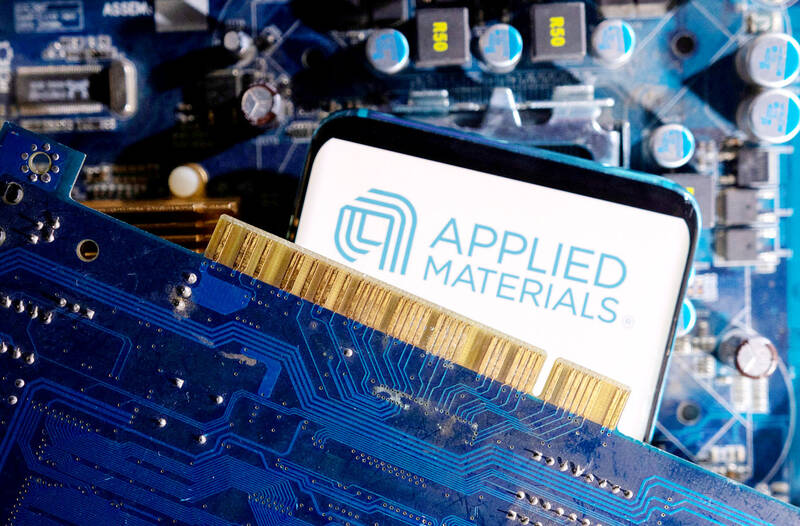Applied Materials Inc, the largest US maker of chip-manufacturing equipment, on Thursday gave a lukewarm revenue forecast for the current period, citing the risk of export controls crimping its business.
Sales would be about US$7.1 billion in the fiscal second quarter, which runs through April, the company said in a statement.
That compares with an average Wall Street estimate of US$7.22 billion.

Photo: Reuters
Profit per shares would be US$2.30, Applied Materials said, in line with projections.
Applied Materials chief financial officer Brice Hill said the company was “taking into account export control related headwinds.”
China makes up about one-third of the company’s sales and stricter trade curbs from the US have made it harder to sell in that nation.
The company’s shares fell about 5 percent in extended trading following the announcement. They had earlier closed at US$184.27, up 13 percent this year.
Export rules adopted in the final months of the administration of former US president Joe Biden would knock about US$400 million off revenue this fiscal year, the company said.
About half of the reduction would come in the current period, with much of it hitting Applied Materials’ service business.
That is because the company would have to stop servicing equipment at some customer sites in China, Applied Materials chief executive officer Gary Dickerson said on a conference call with analysts.
In the long term, Dickerson said he expects the company’s service operations to resume healthy growth.
China accounted for 31 percent of sales last quarter, down from 45 percent a year earlier.
A surge in orders from Chinese memorychip makers has not continued into this year, the company said.
Meanwhile, Applied Materials is enjoying high demand for the most advanced types of equipment needed for artificial intelligence (AI) components, Dickerson said.
That is making up for weaker demand from makers of less complicated chips, he said.
“The biggest driver for the whole industry is AI,” he said.
The amount of silicon going into data centers — facilities that handle much of the AI workload — will soon surpass the level consumed by personal computers and smartphones.
Those have traditionally been the two biggest markets for chipmakers.
First-quarter profit was US$2.38 per share, excluding some items, compared with an estimate of US$2.28. Revenue gained 6.8 percent to US$7.17 billion. Analysts projected US$7.15 billion.
The company is facing tax changes in Singapore, resulting in an expense of US$644 million, or US$0.79 per share during this fiscal year.
Applied Materials’ management has maintained confidence in the overall growth of the industry.
The rapid spread of semiconductors to new products and the AI boom would help maintain demand, Dickerson said.
The sheer complexity of chips has also added pressure on customers to upgrade their equipment, he said.
Customers of Applied Materials include some of the biggest names in the chip industry, including Taiwan Semiconductor Manufacturing Co (台積電), Samsung Electronics Co and Intel Corp. Those manufacturers order gear well ahead of starting production, making Applied Materials’ forecasts a barometer for demand.

Anna Bhobho, a 31-year-old housewife from rural Zimbabwe, was once a silent observer in her home, excluded from financial and family decisionmaking in the deeply patriarchal society. Today, she is a driver of change in her village, thanks to an electric tricycle she owns. In many parts of rural sub-Saharan Africa, women have long been excluded from mainstream economic activities such as operating public transportation. However, three-wheelers powered by green energy are reversing that trend, offering financial opportunities and a newfound sense of importance. “My husband now looks up to me to take care of a large chunk of expenses,

SECTOR LEADER: TSMC can increase capacity by as much as 20 percent or more in the advanced node part of the foundry market by 2030, an analyst said Taiwan Semiconductor Manufacturing Co (TSMC, 台積電) is expected to lead its peers in the advanced 2-nanometer process technology, despite competition from Samsung Electronics Co and Intel Corp, TrendForce Corp analyst Joanne Chiao (喬安) said. TSMC’s sophisticated products and its large production scale are expected to allow the company to continue dominating the global 2-nanometer process market this year, Chiao said. The world’s largest contract chipmaker is scheduled to begin mass production of chips made on the 2-nanometer process in its Hsinchu fab in the second half of this year. It would also hold a ceremony on Monday next week to

State-run CPC Corp, Taiwan (CPC, 台灣中油) yesterday signed a letter of intent with Alaska Gasline Development Corp (AGDC), expressing an interest to buy liquefied natural gas (LNG) and invest in the latter’s Alaska LNG project, the Ministry of Economic Affairs said in a statement. Under the agreement, CPC is to participate in the project’s upstream gas investment to secure stable energy resources for Taiwan, the ministry said. The Alaska LNG project is jointly promoted by AGDC and major developer Glenfarne Group LLC, as Alaska plans to export up to 20 million tonnes of LNG annually from 2031. It involves constructing an 1,290km

TECH CLUSTER: The US company’s new office is in the Shalun Smart Green Energy Science City, a new AI industry base and cybersecurity hub in southern Taiwan US chip designer Advanced Micro Devices Inc (AMD) yesterday launched an office in Tainan’s Gueiren District (歸仁), marking a significant milestone in the development of southern Taiwan’s artificial intelligence (AI) industry, the Tainan City Government said in a statement. AMD Taiwan general manager Vincent Chern (陳民皓) presided over the opening ceremony for the company’s new office at the Shalun Smart Green Energy Science City (沙崙智慧綠能科學城), a new AI industry base and cybersecurity hub in southern Taiwan. Facilities in the new office include an information processing center, and a research and development (R&D) center, the Tainan Economic Development Bureau said. The Ministry